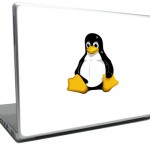Feedback:
- John, KF6EFG, commenting on the OGG vs. MP3 debate in episode 43, agrees that MP3 is the preferred file format because that it is supported by most media players. He realizes that OGG is superior, but until vendors like Apple support it, it will not gain on MP3. Richard thinks it's because Apple cannot add DRM to OGG files. Russ thinks that if Apple did use OGG, they'd sell more iPods. In any case, LHS will not drop the MP3 feed.
- Lief, KC8RWR, writes a detailed reply to comments Randall, KC4WZE, made in episode 44 about running the same applications on cell phones and computers. There is a way to hack an Android phone to run Debian, or run Android on your desktop. Check out the TuxPhone project. Richard and Russ discuss.
- John, EI7IG, was interested in the discussion of Logbook of The World in episode 43. He pointed us to www.rickmurphy.net/lotw for a newer version of TrustedQSL created by Rick Murphy, including a Linux version. Russ tried it and it works. (Ed. note: The softare is no longer available on Rick Murphy's site. Evidently, it has been obsoleted by Trusted QSL 1.13 from ARRL. Linux source packages to compile the library and program are available from the LoTW Instructions page.)
- David, M0DCM, writes that he was recently at the Telford Hamfest and found that Linux was represented there, thanks to the Shropshire Linux User's Group and MAXPAK, the Midlands AX25 Packet Radio User Group. They had demonstrations of Linux machines running Fldigi and WSPR, showing just how far Linux has come. They gave away a bunch of Ubuntu CDs, some to LHS listeners! (A couple UK podcasts for ham radio and Linux are the ICQ Podcast and the Ubuntu UK Podcast.)
- Russ was at the Joplin ARC Hamfest and had the LHS booth there. He gave away 20 Ubuntu 10.04 CDs. WebSDR was a big hit, too.
Announcements:
- May 6-7, 2011: MAGNet Conference in St. Louis, MO. See magnetcon.info for information. If you know anyone that might be a sponsor, exhibitor, or speaker, please let us know. Application forms are available on the web site. Registration will begin December 1, 2010. There will be a live music concert and coctail hour at the close.
- Links to LHS merchandise have been added to the LHS website. Click the SHOP! link under the banner.
Topics:
- Websites of interest:
- Ubuntu Linux for Hams, by Bert, AB0VI, was featured on the main ARRL web page.
- My Ham Shack provides a free personal web page for ham radio operators. Lots of guys post pictures of their shacks, QSL info, equipment list, etc.
- It's More Complicated Than That!. A blog by one of the Ubuntu developers, Steve Conklin, AI4QR. Recently, he's been working on controlling a Softrock software defined radio (SDR) with Linux.
- Linux ham software:
- More ham radio applications are showing up in the Linux repos, like PSKmail, bulletin board programs, and more. Richard begs for someone to update the 2001 Linux Amateur Radio AX.25 HOWTO.
- CallGit, a callsign lookup tool that retrieves data from QRZ.com.
- gPredict, a real-time satellite tracking and orbit prediction program.
Contact Info:
- Contact Richard at kb5jbv@gmail.com, Russ at k5tux@lhspodcast.info, or both at the same time at info@lhspodcast.info.
- Listen to the live stream every other Tuesday at 8:00pm Central time. Check the LHS web site for dates.
- Leave us a voice mail at 888-455-0305 or 417-200-4811, or record an introduction to the podcast.
- Sign up for the LHS mailing list.
- Thanks to Dave from Gamma Leonis for the theme music.
Music:
- "Balrog Boogie" by Diablo Swing Orchestra from the album "The Butcher's Ballroom."
